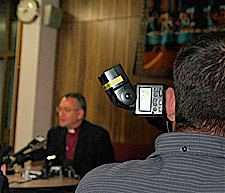
The new head of Australia's four million Anglicans says his first priority is not to lobby the government over workplace reform, or see women become bishops, or even to deal with the homosexuality row, but to get more people sitting in the pews on Sundays.
And he's hoping to learn from Sydney Anglicans to do it.
The newly-elected Primate, Archbishop of Brisbane Dr Phillip Aspinall says he has many plans to reverse the widespread decline in church attendance across the country.
Dr Aspinall, who at age 45 is the youngest Primate in recent history, says mission "is at the forefront of my mind' and urged churchgoers to focus on evangelism.
He wants to see Anglicans getting involved in mission activities such as church planting, advertising and running evangelistic dinners like the Alpha course.
In doing this he says "we can learn a lot from what's happening in Sydney [Diocese] over the past decade'.
Dr Aspinall has been Archbishop of Brisbane since 2001 and beat Archbishop of Sydney Peter Jensen to the role of Primate in a secret ballot in Sydney on Saturday.
Speaking in Sydney yesterday, Dr Aspinall says he wants Anglicans to have more confidence in their faith, admitting they have "come in for a bit of a beating' over sex abuse furores in the church and society's increasing secularisation.
Nineteen of Australia's 23 dioceses have experienced a decline in church membership over the past 10 years.
The Anglican Church's governing body has called on churchgoers to be more committed to mission, amid warnings the Church may only have 10 years left unless radical outreach strategies are promoted.
But the Church's strategic issues think tank " of which Dr Aspinall is a former member " admitted last year it has "no strategies' to tackle chronic decline in church attendance, despite two years of talks.
"We've got to think creatively about how to maintain church life," Dr Aspinall said, warning that Anglican schools, aged care facilities and parishes need to work more closely together and schools should provide their staff with theological training
"It concerns me that we need to do better with children and young people," he says.
"We can do better with our schools. I'd like the staff at our schools to get the opportunity to grow spiritually, and make our schools real communities of faith."
On the subject of church planting, Dr Aspinall warned he would not encourage dioceses "acting unilaterally' and crossing boundaries.
"Dioceses should respect other dioceses. We have to be careful about that."
The new Primate's call for a renewed focus on mission appears to be at odds with the approach of his predecessor, Dr Peter Carnley, who last year labelled such talk "depressing' and church planting "mundane'.
Dr Aspinall has rejected allegations in recent days that he was linked to the sex abuse of a young man by a minister in Tasmania in the 1980s.
He admitted feeling frustrated that the allegations were being raised again and says the Church needs to be more proactive in dealing with sex abuse.
Like the appointment of Dr Carnley, Dr Aspinall's tenure will fail to please conservative evangelicals.
The new Primate is known as a theological liberal but, like his predecessor, "he doesn't like the word'.
He is a well known supporter of women bishops and homosexuals in the church.
He raised the ire of conservatives when he signed a pro-homosexual statement during the 1998 Lambeth conference while an assistant bishop in Adelaide and acted as an official advisor to the Lesbian and Gay Christian Movement's conference at Manchester University in 2003.
In 2003 he invited controversial US Episcopal Bishop and author John Shelby Spong to preach in the Diocese of Brisbane, reversing a ban by the previous Archbishop Dr Peter Hollingworth.
Dr Aspinall said yesterday Anglicans need to take human reason seriously and be open to biblical interpretation.























